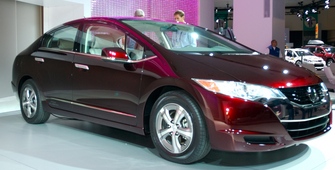« Prev Next »
 Three exceptional vehicles from the German manufacturer Mercedez-Benz have recently completed a landmark tour: around the world in 125 days. Traveling a distance of more than 18,600 miles (30,000 km), these cars rolled through fourteen countries in four continents before returning back at their start point in Stuttgart, Germany, April 10.1 Notwithstanding this impressive duration, for me and for others, this trek was intriguing for reasons unrelated to the luxury features or speeds of the automobiles involved. Instead, these B-Class F-CELL autos gained our attention for accelerating the green energy race with the endorsement of a controversial favorite: hydrogen power.
Three exceptional vehicles from the German manufacturer Mercedez-Benz have recently completed a landmark tour: around the world in 125 days. Traveling a distance of more than 18,600 miles (30,000 km), these cars rolled through fourteen countries in four continents before returning back at their start point in Stuttgart, Germany, April 10.1 Notwithstanding this impressive duration, for me and for others, this trek was intriguing for reasons unrelated to the luxury features or speeds of the automobiles involved. Instead, these B-Class F-CELL autos gained our attention for accelerating the green energy race with the endorsement of a controversial favorite: hydrogen power.
The series' name reflects the energy emphasis, as "F-CELL" refers to the space beneath the floorboards where electrochemical fuel cells combine hydrogen gas with oxygen to produce electricity, which in turn powers a hybrid electric engine. As the sole by-product of the process is water, hydrogen fuel has been lauded by advocates as a zero-emission energy deserving of priority investment. But this stance has its detractors: in the US, the Obama administration's 2012 budget proposes another road to oil independence, backing electric car research while cutting funds for hydrogen programs by $70 million, or 40%, from the prior year.2 Likewise, a recent Department of Energy report outlining US technology goals lacks a single mention of hydrogen in its 40 pages.
None too pleased, two members of the federal hydrogen advisory committee have resigned in protest. In response, US Energy Secretary Steven Chu has defended his department's decisions, citing a National Research Council report estimating that the infrastructural transition to a hydrogen economy would require a federal investment of $55 billion over 15 years. While electric cars can be charged at home, it seems that hydrogen-powered cars need to be refilled approximately every 260 miles (400 km), making long distance US travel difficult as public refueling stations are now available in only 19 states.
In addition to logistics, detractors have also criticized hydrogen for being ecologically damaging and unsecure. As hydrogen is derived from fossil fuels, critics have voiced concern over the large amounts of methane being released from natural gas wells, arguing that the environmental impact has been shifted from the consumption stage to the production one.3 In regard to safety and the risk of uncontrolled combustion, advocates contend that innovations have majorly reduced the risks of stored hydrogen. In one British lab, nanofibers are being processed into plastic-encapsulated micro-beads capable of absorbing hydrogen, a design that allows for hydrogen to be deployed like a liquid, both increasing the rate of energy release and lowering its operational temperature.4
This past weekend, research teams from across the US competed in the Eco-Marathon, a decades-old race sponsored by the Shell company that attracts various kinds of energy efficient vehicles. Did one of the hydrogen-powered cars, such as University of Missouri's Tigergen II, win for greenest auto? As of now, the victors have yet to be announced. But no matter which kind of vehicle takes first place, I'm now wondering if with the push for hydrogen-powered cars, something else entirely is being lost.
Image Credit: Wikipedia
Image depicts the hydrogen-powered 2008 Honda FCX Clarity.
1. Cato, J. "The Dream of Fuel Cells for Cars Lives On." The Globe and Mail. March 25, 2011.
2. Whoriskey, P. "Automakers Call for More Support for Hydrogen." The Washington Post. April 15, 2011.
3. Zeller Jr., T. "Studies Say Natural Gas Has Its Own Environmental Problems." The New York Times. April 11, 2011.
4. Kurban, Z., Lovell, A., Bennington, S., Jenkins, D., Ryan, K., Jones, M., Skipper, N., & David, W. (2010). A solution selection model for coaxial electrospinning and its application to nanostructured hydrogen storage materials. The Journal of Physical Chemistry C, 114, 21201-21213 DOI: 10.1021/jp107871v ResearchBlogging.org.























http://www.shell.com/home/content/ecomarathon/americas/media/event_highlights/2011/04172011_final.html